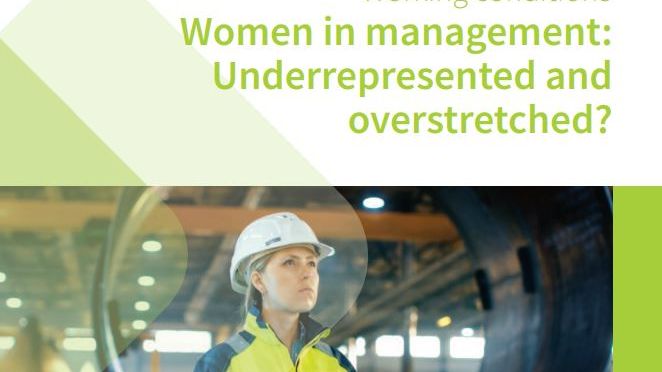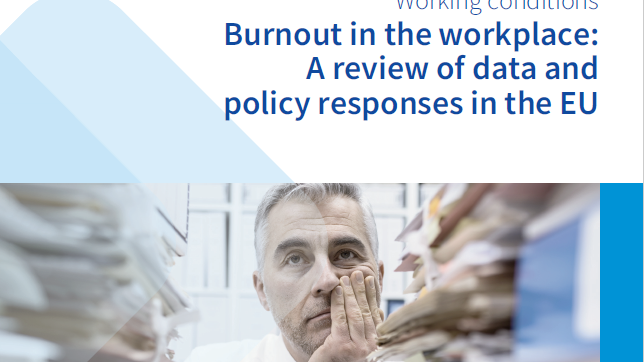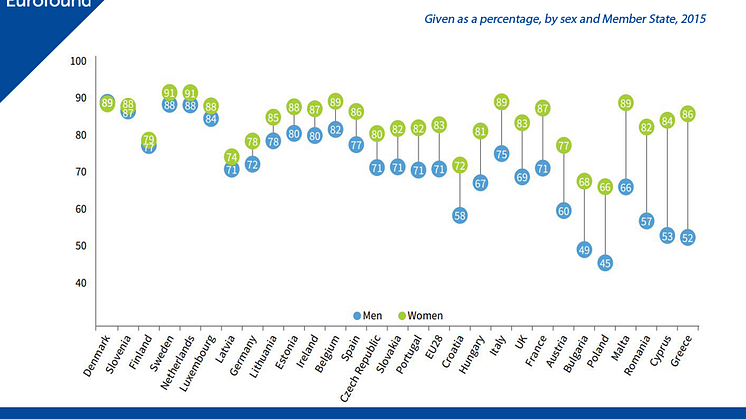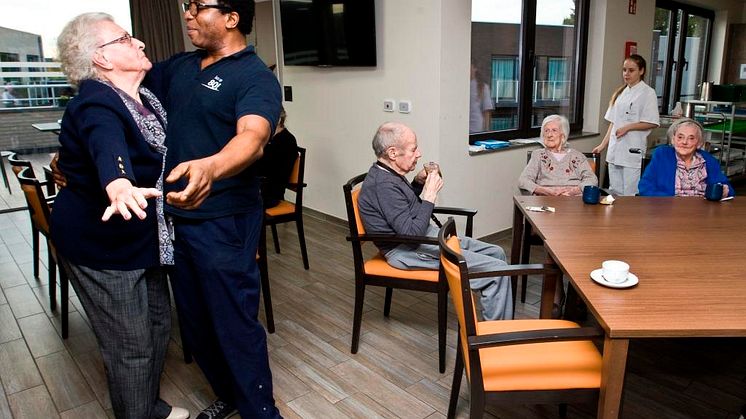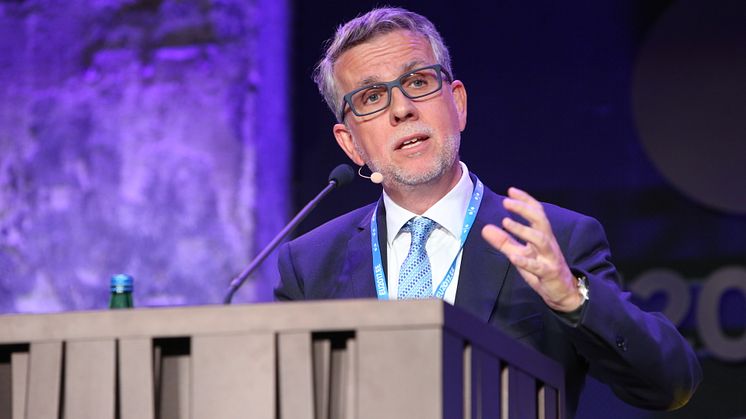
Blog post -
Progress in paternity and parental leave for fathers – Are baby steps enough?
|
The uptake of paternity and parental leave by fathers will be one of the issues discussed at Eurofound’s event on work-life balance in Brussels on 16 October. The event is now sold out, but is available as a webcast. Click here for more information and to register. |
Few events challenge the equilibrium between work and life like the arrival of a child. As gender roles continue to change in Europe, supporting the uptake of paternity and parental leave among fathers is fundamental, not just to close the ‘caring gap’ between men and women, but also to provide the best possible outlook for coming generations.
The importance of maternity leave for child development, as well as broader social cohesion, is well established. Research has shown that maternity leave and extended periods of parental leave for mothers result in lower rates of infant mortality,1 increases in child birth-weight and higher rates of childhood vaccination.2
There is also increasing evidence of the importance of paternity leave and parental leave for fathers. Research carried out for the OECD, for instance, has shown that when fathers take longer periods of leave after the birth of a child, they are more involved in their child’s care later in infancy and childhood. This involvement is beneficial for the cognitive development of children.3
The uptake of paternity and parental leave by fathers is also important in order to address the caring gap between men and women. The 2016 European Quality of Life Survey showed that 88% of mothers compared to 64% of fathers in the EU care for their children every day. These fathers estimate they give 21 hours per week to the care of their children, while the mothers dedicate 39 hours per week.
- News: Sharing caring
Growing uptake by fathers
The good news is that there is increasing recognition of the importance of fathers taking up family-related leave in Europe – and this is reflected in the ongoing changes to legislation and employment law. By now, all Member States offer at least one option to fathers to take time off work to care for children: either paternity leave, for a short period around the birth, or parental leave, which allows parents to take periods of leave beyond the birth and into the early formative years of the child. Cyprus, the Czech Republic and Ireland were the last Member States to introduce paternity leave entitlements for fathers, between 2016 and 2018.
Although paternity leave is generally well paid, usually without significant loss of earnings, it is also very short. In seven EU countries it is one week or less, and it exceeds two weeks only in Bulgaria, Finland, Lithuania, Portugal, Slovenia and Spain. Eurofound’s new report Paternity and parental leave: Uptake by fathers, due to be published later this month, shows that the uptake of this leave by fathers is generally stable or increasing in Europe, with a marked rise in Portugal since 2009 and the Baltic states and Poland from 2013 to 2017.
Parental leave is typically less well compensated, and the compensation often decreases with increasing duration of the leave. In fact, in six EU Member States there is no statutory compensation. Despite this, the proportion of fathers availing of parental leave has risen in recent years – albeit from a low base in a number of Member States. In Germany, for instance, 21% of children born in 2008 versus 34% of children born in 2014 had been cared for by their fathers on parental leave for an average of three months; in Estonia the share of fathers among parents receiving parental benefit increased from 2% in 2004 to 9% in 2017; and among higher-earning parents who receive parental benefit at the maximum rate, fathers’ share increased from 7% to 29%.
This increase in uptake, however, is not universal throughout Europe. In Latvia, for example, the number of fathers taking parental leave dropped significantly following changes to parental benefits after the onset of the financial crisis in 2008. And the share of fathers among parents availing of any type of parental leave remains below 10% in Bulgaria, Croatia, the Czech Republic, Hungary, Slovakia and Spain.
While data on the duration of parental leave periods is scarce, figures from the limited number of countries where it is available suggest that the duration of paid leave continues to be substantially longer among mothers than among fathers: 4 times longer in Germany and Sweden and 10 times longer in Denmark. Even in Sweden, were most fathers take at least some days of parental leave, only 13% of parents share their entitlement equally (in this case, meaning shared on a 40–60 basis).
Compensation, expectation and frustration
Given the important role that fathers play in child-rearing and the pervasive imbalance in domestic work between men and women, the overall increases in father’s uptake of parental leave is welcome. But, in the context of rapid societal and labour market change over the past number of years, progress is slow. The Eurofound report identifies three main challenges. First, there is the design of leave for the care of children, where the rate of compensation can discourage uptake, as can inflexibility. Surveys in a number of European countries, including Belgium, the Czech Republic, Finland and Norway, show that fathers are concerned about the income reduction that comes with parental leave.
Second, fathers often report that a key disincentive is a lack of support from their employers, and a lack of understanding as to why a father would want to stay at home with their child for a prolonged period. Fathers have also expressed frustration at the administrative difficulties in obtaining parental leave – particularly in relation to the complexity of the forms. For example, when 972 recipients of the German Elterngeldplus parental benefit were surveyed about their experience, the vast majority reported that they found the application procedure difficult – with more men than women expressing difficulty. Third is the fact that fathers may not have a legal entitlement to take family leave and receive compensation.
These obstacles have greatest impact on fathers with lower educational attainment, with lower income or working in manual occupations, who are less likely to avail of parental leave.
Slow pace of change
Establishing a detailed picture of fathers’ uptake of paternity and parental leave in Europe is no easy task. Differences in terminology, how leave is designed, and how data are collected and reported can be challenging when research seeks to compare countries. But perhaps the most regrettable thing is the vastly different opportunities for fathers to be, and to choose to be, at home with their children. While in some countries paternity leave and parental leave for fathers is a relatively new concept, and research has shown that some fathers are faced with a non-supportive environment,4,5 in countries like Sweden it is long established, and the debate has shifted to sharing leave entitlements equitably between both parents.
What Eurofound’s new research shows is that there is greater uptake of paternity and parental leave among fathers, and things are broadly moving in the right direction, albeit at a different pace across the EU Member States. However, when it comes to the push for gender equality and ensuring that children have all the possible support and resources that they need, baby steps just might not get us to these goals quickly enough.
References:
1. Tanaka, S. (2005), Parental leave and child health across OECD countries , Economic Journal, Vol. 115, No. 501, pp. F7–F28.
2. Daku, M., Raub, A. and Heymann, J. (2012), Maternal leave policies and vaccination coverage: A global analysis , Social Science & Medicine, Vol. 74, No. 2, pp. 120–124.
3. Huerta, M., Adema, W., Baxter, J., Han, W., Lausten, M., Lee, R., and Waldfogelv, J. (2013), Fathers’ leave, fathers' involvement and child development: Are they related? Evidence from four OECD countries , OECD Social, Employment and Migration Working Papers, No. 140, OECD Publishing, Paris.
4. Bencsik, A. and Juhász, T. (2012), Férfiak gyesen, gyden? [Fathers on childcare leave?] , A Virtuális Intézet Közép-Európa Kutatására közleményei, Vol. 4, No. 5, pp. 133–143.
5. Takács, J. (2017), Aktívan törődő apák Magyarországon [Actively caring fathers in Hungary. Sociological] , Szociológiai Szemle, Vol. 27, No. 3, pp. 104–126.

